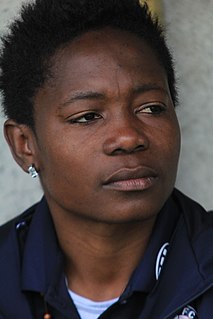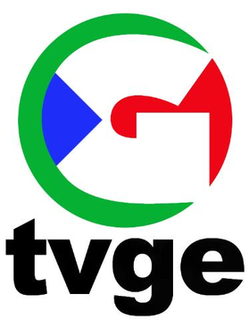Telecommunications in Equatorial Guinea include radio, television, fixed and mobile telephones, and the Internet.

María Nsué Angüe was a noted Equatorial Guinean writer and Minister of Education and Culture.
The National Democratic Union of Equatorial Guinea is a liberal party in exile from in Equatorial Guinea. The party is a member of Liberal International.
The Lengue language, also called Molengue, Balengue, Molendji, is a Bantu language of southern Equatorial Guinea, spoken by the Lengue people between Bata and the Gabon border near the coast. The speakers have come under increasing Fang influence. The Ethnologue describes it as a member of the B subgroup of Northwest Bantu, while Echegaray is more specific, saying that it is linguistically a member of the Sheke group :

The Mauritania national football team nicknamed Al-Murabitun in reference to Almoravid dynasty, is the national team of Mauritania and is controlled by the Fédération de Football de la République Islamique de Mauritanie and is a member of the Confederation of African Football. They have not qualified for the FIFA World Cup. However, in the Amilcar Cabral Cup, a regional tournament for West Africa, Mauritania came fourth in 1980 on hosting the competition. The national football team of Mauritania were later runners-up in 1995, losing on penalties to Sierra Leone after the final finished 0–0. On 18 November 2018, Mauritania qualified to the 2019 Africa Cup of Nations for the first time in their history, after they won 2–1 against Botswana.
The Equatorial Guinea national football team, nicknamed Nzalang Nacional, is the national team of Equatorial Guinea and is controlled by the Equatoguinean Football Federation. It is a member of Confederation of African Football (CAF). Though Equatorial Guinea has traditionally been one of the lowest ranked teams in Africa, the recent influx of Spanish-born players of Equatoguinean heritage has strengthened the national team and resulted in some solid performances. They qualified as co-hosts for the 2012 Africa Cup of Nations. The hosting of the tournament lead to the construction of two new football stadia in the country: Estadio de Bata in Bata on the mainland, and Estadio de Malabo in Malabo. The national team managed a creditable fourth place at the 2015 Africa Cup of Nations, which was held in Equatorial Guinea.
Radio Nacional (Spanish) or Rádio Nacional (Portuguese), both meaning National Radio, may refer to:
The media in Equatorial Guinea is primarily run by the state. Radio and Television Asonga are not officially run by the state, but by people close to the administration.
The Equatorial Guinea women's national football team is the women's national team for Equatorial Guinea. Their nickname is the Nzalang Nacional.
Atanasio Ndongo Miyone was an Equatoguinean musician, writer and Fang political figure. He wrote the lyrics to Equatorial Guinea's national anthem, Caminemos pisando las sendas de nuestra inmensa felicidad. He was executed in 1969 following a failed coup to depose Francisco Macías Nguema, the first ruler of an independent Equatorial Guinea.
Rui Fernando da Gracia Gomes, simply known as Rui, is a footballer who plays as a centre back.

Genoveva "Ayo" Añonma Nze is an Equatoguinean footballer who plays as a striker for Deportivo Evinayong and the Equatorial Guinea national team, where she serves as its captain.
Gloria Chinasa Okoro is a footballer who plays as a midfielder for Estrellas de Waiso Ipola and the Equatorial Guinea women's national team.

Richard Nguema Balboa is a Spanish-Equatoguinean professional basketball player who last played for Cañeros del Este of Dominican top division Liga Nacional de Baloncesto.
Ghyslaine Salomé Nke Noah is a Cameroonian-born Equatoguinean-naturalised footballer who plays as a defender for Estrellas de Waiso Ipola, where she serves as its captain, and the Equatorial Guinea women's national team.
Saúl Basilio Coco-Bassey Oubiña, better known as Saúl Coco, is an Equatoguinean professional footballer who plays as a centre back for Spanish Tercera División club UD Las Palmas C and the Equatorial Guinea national team.

The Idea Popular de Guinea Ecuatorial (IPGE) was a nationalist political group created at the end of the 1950s with the goal of establishing independence in Equatorial Guinea. The IPGE is considered to be the first formal Equatoguinean political party. The IPGE was founded by a group of exiles living in Gabon and Cameroon, with their official headquarters in Ambam. Early party leaders included Clemente Ateba, José Perea Epota, Antonio Eqoro, Jaime Nseng, and Enrique Nvó, who was credited for starting the IPGE during his time in exile in Ambam. Nvo's radical political ideas and his rise to power in sections of northern Rio Muni concerned Spanish authorities, who allegedly paid contract killers to assassinate him in 1959.

Televisión de Guinea Ecuatorial is an Equatorial Guinean state television channel, which is part of the public media system called Radio Televisión de Guinea Ecuatorial (RTVGE).






